Mujaddid IOS Centre for Arts & Literature organises discussion on Urdu Journalism and Maulana Abdul Waheed Siddiqui
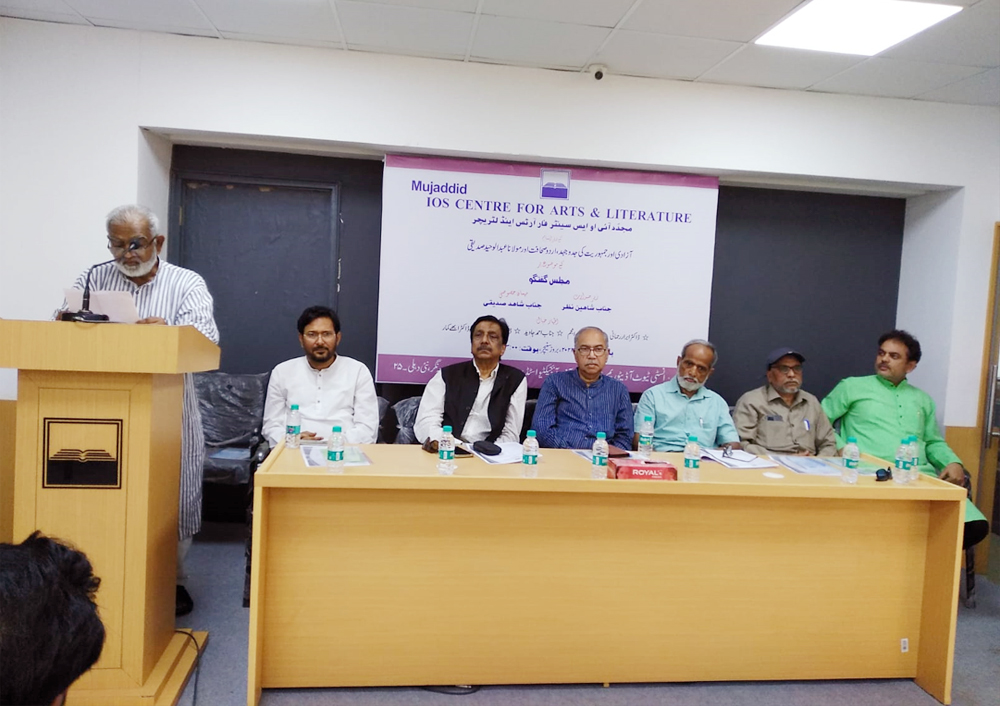
Mujaddid IOS Centre for Arts & Literature organises discussion on Urdu Journalism and Maulana Abdul Waheed Siddiqui
New Delhi: A discussion on the ‘Struggle for Independence and democracy: Urdu journalism and Maulana Abdul Waheed Siddiqui’, was organised by the Mujaddid Centre for Arts & Literature, a the auditorium of the Institute of Objective Studies on May 27, 2023.
The programme began with the recitation of a Quranic verse by Hafiz Athar Husain Nadwi with its translation in Urdu.
Introducing the topic, the convenor of the Centre, Anjum Naim presented a brief profile of Maulana Abdul Waheed Siddiqui and his contribution to Urdu journalism during post-Independence period.
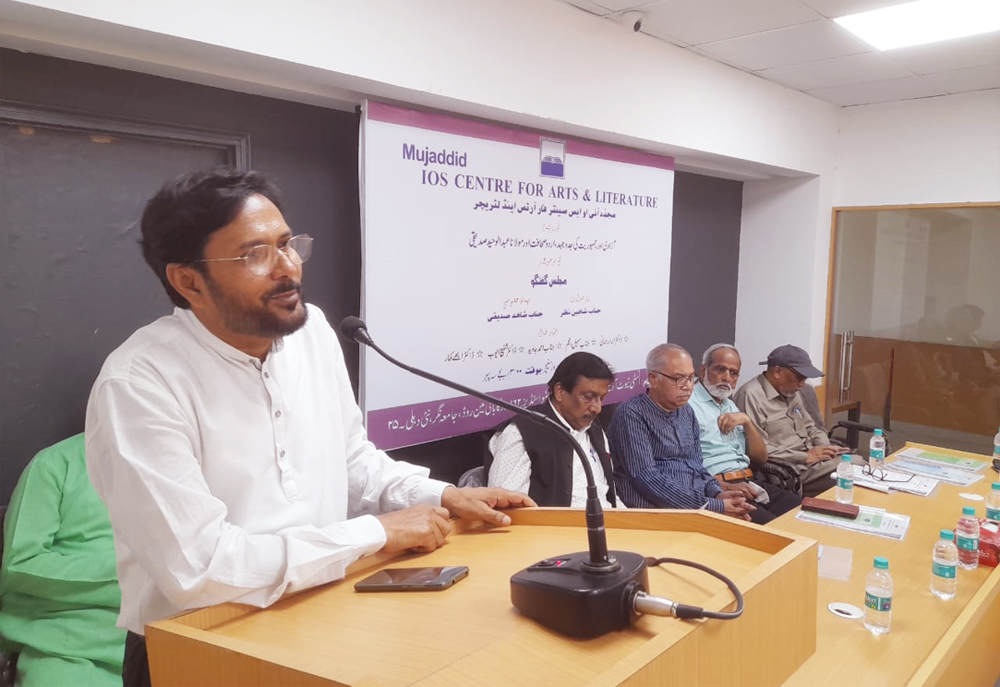
Initiating the discussion, senior Urdu journalist and writer, Ahmad Javed said that the model used by Maulana Abdul Waheed Siddiqui in the business of journalism in the first decade of Independence in the form of the Urdu daily Nai Duniya, brought out on July 15, 1951, was still relevant and effective. Nai Duniya spearheaded the movement for journalistic freedom after Independence. Urdu journalism positively contributed to the preservation and stability of Independence. Regrettably, the names of the old journalists who ceaselessly fought for the freedom of expression had been forgotten. It was Maulana Abdul Waheed Siddiqui who led these journalists in his quest for press freedom. He held that 15th July became a milestone in the history of the reporting of parliamentary proceedings. In order to regulate press reporting, the Prime Minister, Pandit Jawaharlal Nehru announced the setting of the Press Commission. Member of Parliament, Firoz Gandhi piloted a private member’s bill in 1955 to facilitate press persons with the freedom to cover events. He was a votary of press freedom and used to frequent the office of Nai Duniya press . This was due to Nai Duniya being better than other newspapers of that time in respect of fairness in reporting. With a view to further regulating the press, Press Council of India was set up in 1965. He observed that the model of journalism presented by Abdul Waheed was not dependent on government advertisements.
Ahmad Javed pointed out that today crowd funding was used by the social media to finance digital media and on-line newspapers. In 1964-65 when Nai Duniya was closed, Maulana Abdul Waheed brought out monthly Huma and Huda digests in Urdu to keep the spirit of journalism alive. Both the monthlies became very popular among readers. He never looked to the market for financial support. He depended only on the readers for the sustenance of his publications. What he did was a type of crowd funding. Rather it was the beginning of a model for survival. In a situation which existed today what could one do when the government and the market came together, he quipped. The occasion was also marked by the discussion on his latest book.
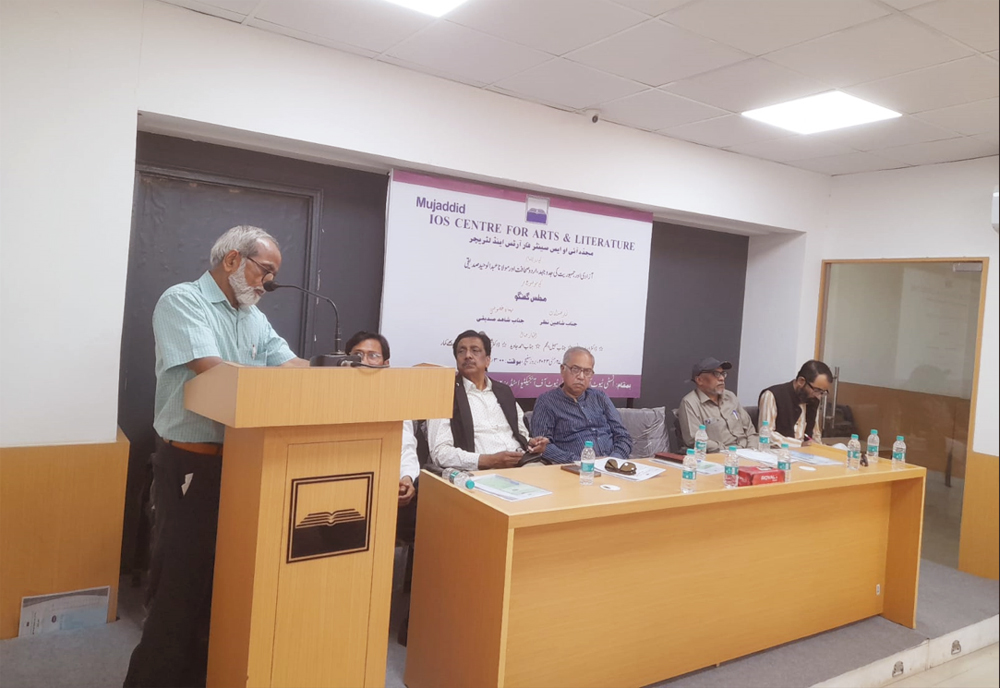
Ex-editor of Urdu monthly Aajkal and critic, Dr. Abrar Rahmani became emotional while remembering the glorious part of Urdu journalism. He said that Nai Duniya and Maulana Abdul Waheed contributed a lot to it. It was a matter of great pleasure that his successors took the Maulana’s legacy forward. Referring to the time of Abdul Waheed signboards in Urdu were a common sight on the buildings in Rampur. There was no institution like Urdu academy at that time, but the use of Urdu among people was very common. He mentioned several names of Urdu journals, including Khilauna, Mahnama Al-Hilal, Shama and Sushma, which hit the market. Urdu magazine, Shama, was so popular that no other publication on cinema could stand anywhere near it. It was Maulana Waheed who proved what a digest meant. Mujrim was another magazine which evoked interest among readers. A magazine under the title, Fauji Risala, was brought to cater to the needs of Urdu-speaking soldiers. Monthly Huma and Huda were brought out by Abdul Waheed in 1966. A number of people learnt Urdu from Jasusi Duniya, he added.
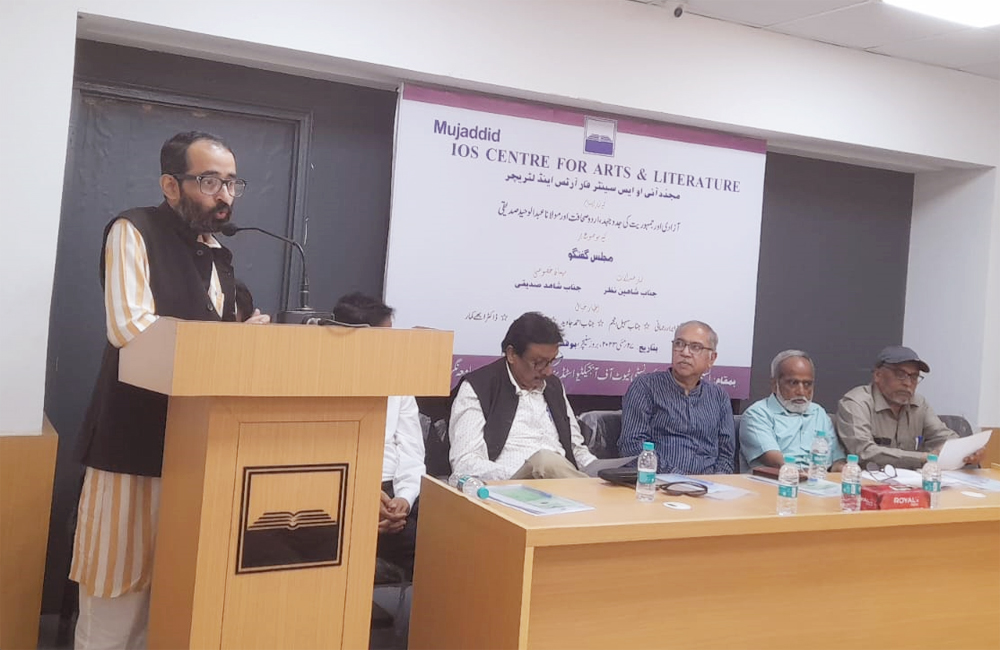
Social activist, Dr. Abhay Kumar, commented that a particular section in the country nurtured bias against Urdu. Comparing Urdu journalism with Hindi press, he said that while Hindi newspapers were trying to create an atmosphere of suspicion, the Urdu press played a positive and constructive role conducive to social and communal harmony. In fact, a fear psychosis gripped Hindi journalism to view every issue from communal prism. This was enough for one to hold his head in shame but nobody dared to open his mouth against it. By and large, Indian media was carrying content that was bordering on hatred. Mainstream media, meaning thereby Hindi media, was most irresponsible in its coverage. He raised the question as to why India GDP stood at fifth place but was placed at 161 in the press freedom index. Mainstream media was constructing false narrative to help the present dispensation. This was so because it had nothing else to do except promote disharmony. On the other hand, Urdu media exercised restraint. But all eyes were set on Urdu media. He dismissed the charge as false that the Urdu media was favouring someone or was being brought out as a ‘file paper’ and or seeking favour for obtaining advertisements. Hindi media turned into a communal media in the wake of Ram Janma Bhoomi movement. The role of Urdu media at that time was very balanced and it exercised maximum restraint. He urged the Muslim community not to fall a prey to inferiority complex and read Urdu newspapers. The history of Urdu media was 200 years old and it needed cooperation of all for its sustenance. The legacy of Urdu journalism was very rich and one should feel proud of it. He asked for digitising Maulana Waheed’s writings.
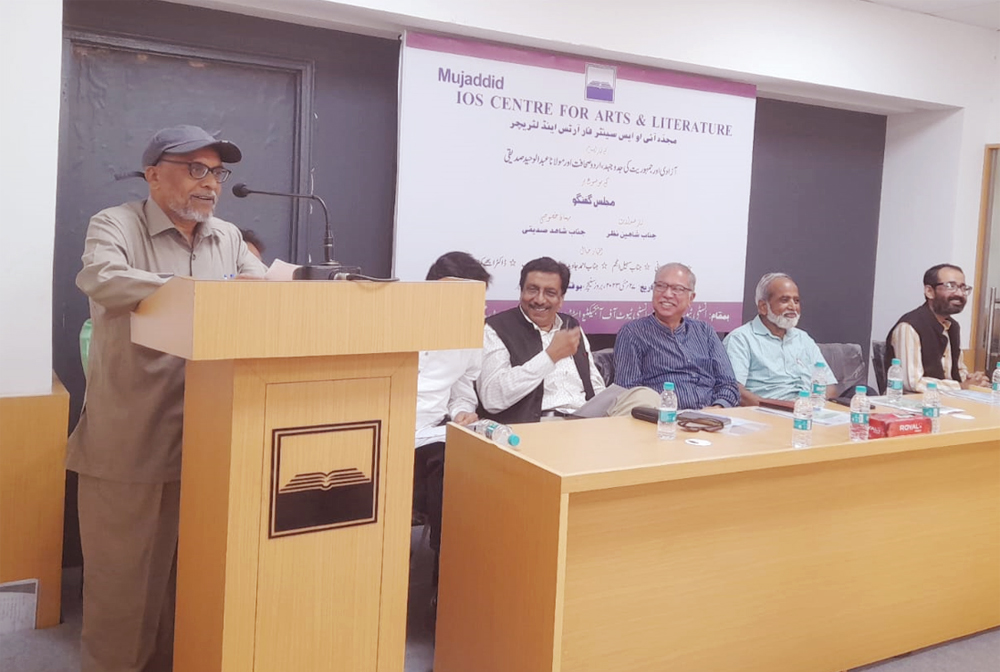
Senior Urdu journalist and writer, Suhail Anjum, dwelt at length on the role of Urdu journalism during the freedom movement. He said that the character of Urdu journalism underwent transformation after Independence. In the post-Independence period, Urdu journalism engaged itself in the promotion of secular values of the polity. Urdu journalism was fighting for that cause even today in the face of heavy odds. Pay glowing tributes to Abdul Waheed Siddiqui, he recorded that the Maulana kept the flag of the freedom of press high throughout his life. He never allowed the truth and righteousness to be compromised. He was not only a journalist, but a Mujahid (Crusader) against whom several criminal cases were filed in which had to go to jail. He had opposed the unceremonious removal of Sheikh Abdulla as Chief Minister of Jammu and Kashmir, Suhail Anjum remarked.
Speaking on the subject, senior journalist and ex-member of parliament, Shahid Siddiqui, observed that Urdu journalism played a crucial role in bringing the Muslims out of a state of shock, dismay, inferiority complex and a sense of defeat after Independence. Muslims had no idea of democracy after Independence; they were unaware of the rights and freedom guaranteed by the Indian Constitution. Under these circumstances, Maulana Abdul Waheed and his contemporaries wrote articles and delivered speeches to assure Muslims that their identity would remain intact under the new dispensation. He said that the question today was if India of Gandhiji, Nehru, Maulana Azad and his colleagues would survive the onslaughts on democracy. Today, Parliament had been reduced to a museum of democracy.
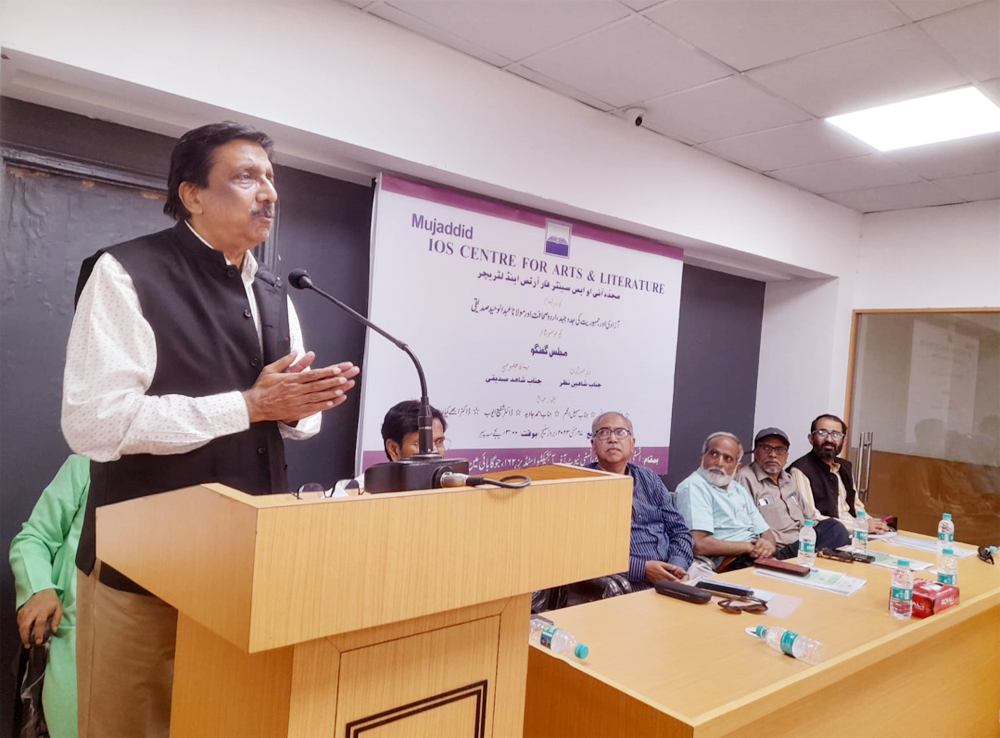
Shahid Siddiqui maintained that Abdul Waheed Siddiqui took Muslims into confidence and told them that the Constitution gave equal rights to citizens irrespective of their religion, castes and creed. Prior to that, a journalist was unaware of his limitations. They did not know if there was freedom of expression. The demand for freedom of speech became shrill after a fine of Rs. 20,000 was imposed on Nai Duniya. It was Firoz Gandhi, the then M.P., who forcefully demand the repeal of the law under which the newspaper was fined. He said that Nai Duniya was not merely a newspaper, but also a movement. In 1955-56, he brought minorities and the Dalits together by lending support to the agitation in Punjab. A group of Muslims used to court arrest every Friday at Gurdwara Sisganj in Delhi at his instance. He was actively involved in the Dalit movement. He openly supported the Republican Party of India. He was not only a journalist, but also an activist. He batted for a multi-party system in a democracy so that a single party could not become dictatorial. He said that he himself brought out a newspaper called Waqeyat which continued for two years.
Shahid Siddiqui regretted that Urdu became a casualty due to the attitude of Urdu speaking people who themselves were responsible for neglect of the language. Uttar Pradesh and Delhi discarded Urdu, but states like Maharashtra, Karnataka, Bihar; etc. continued to patronise it. Illustrating his point, he said that not a single student in UP passed the High school examination with Urdu as a subject. He stressed the need for keeping Urdu and Urdu journalism alive. Similarly, the country as a democracy should survive. In an atmosphere where hatred was reigning supreme, the situation today was worse than that existed in 1947. Democracy was under threat and Urdu newspapers had been taken over by corporate houses, he concluded.
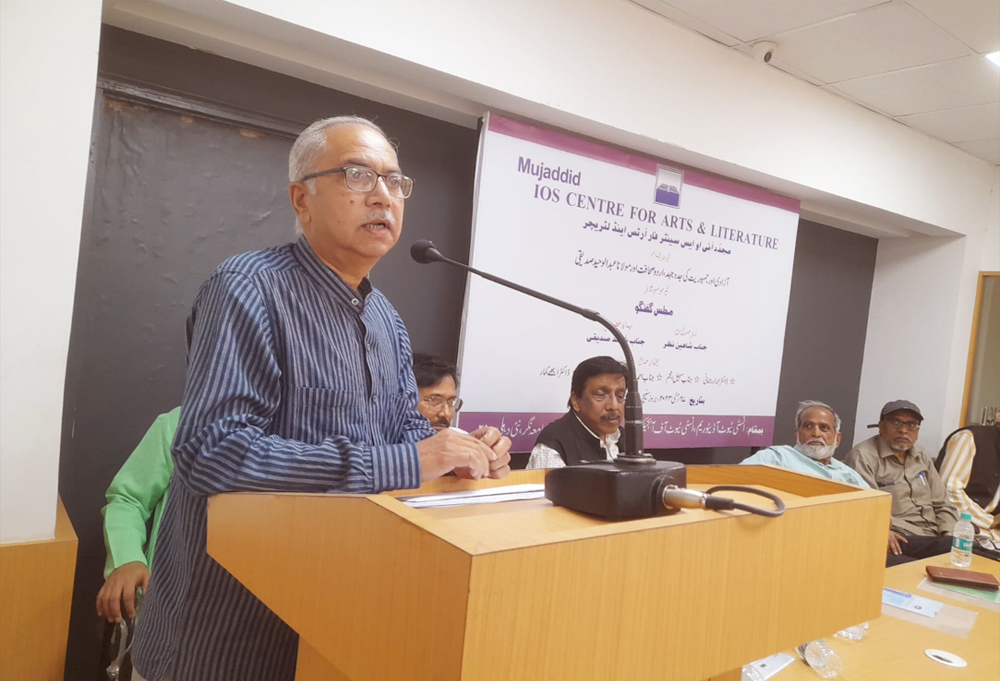
In his presidential remarks, noted journalist and the professor of journalism, Shaheen Nazar, held that the predecessors to this generation had launched the first struggle and bravely faced the odd situation. But the onus now to wage another war for the survival of democracy and independence rested on the shoulders of the present generation. He said that this war could be won only by wriggling ourselves out of inferiority complex. He asked the Urdu journalists to play their active role in creating an atmosphere of courage, fairness and honesty which was dear to the founding fathers of journalism.
At the end of the function, Anjum Naim proposed a vote of thanks to all those present. Among those who attended the function, included well-known Urdu writer and columinist, Azim Akhtar, Syed Zafar Hasan, Ashraf Bastavi, Md. Kaleem, Dr. Sami Ahmad, Dr. Javed Hasan, Dr. Shoeb Raza Khan, Mohammad Afzal Khan, Safi Akhtar, Maulana Anwar Ali, Nafeesur Rahman, Suhail Hashmi, Ishrat Zaheer, Javed Ahmad, Dr. Jawed Hasan, Waseem Ahmad and a number of journalists and Urdu lovers. The proceedings of the function were conducted by Dr. Shafi Ayyub.
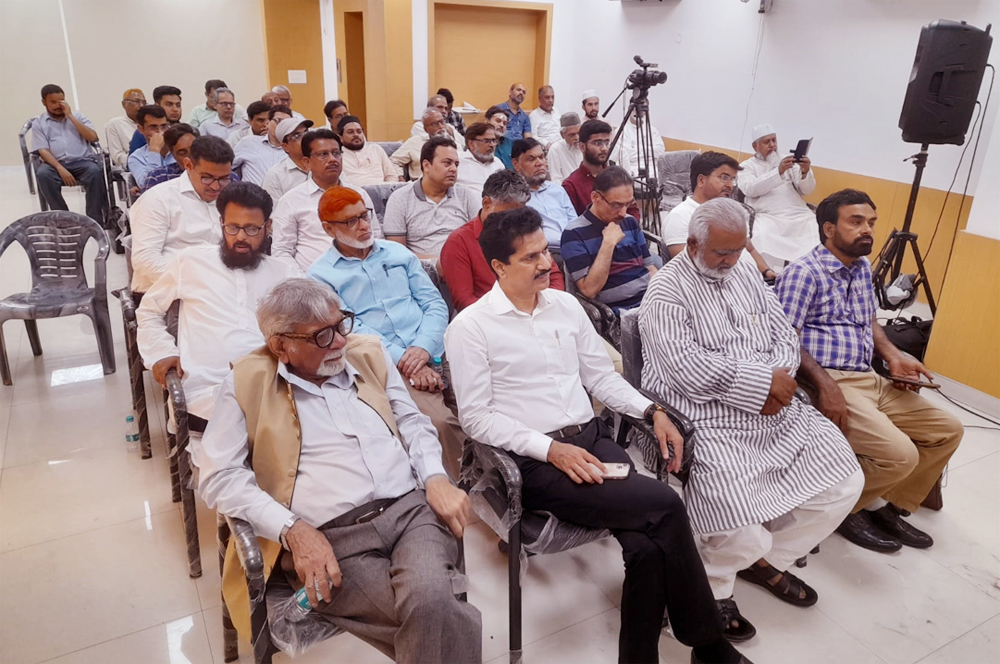
A view of audience
Go Back